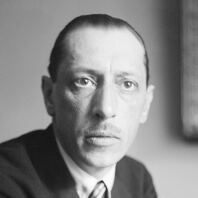Igor Stravinsky
Compositeur
Igor Stravinsky est, avec Arnold Schönberg et Claude Debussy, le compositeur le plus influent de l’époque moderne. La création en 1913 du ballet Le Sacre du printemps, dans lequel Stravinsky libère la rythmique du corset des unités de mesure et se livre à des expérimentations sur la polytonalité, marque un jalon majeur dans l’histoire de la musique. Avec des compositions comme Pulcinella, Stravinsky devient plus tard la figure tutélaire du courant néo-classique. Dans les dernières années de sa vie, son langage musical en perpétuelle évolution intègre des structures sérielles et propose une assimilation originale du dodécaphonisme de Schönberg. Sa vie reflète les bouleversements et les conflits du XXe siècle, Stravinsky ayant lui-même parfois flirté avec le fascisme de Mussolini.
Contraint à quitter son pays natal, le compositeur a pris successivement les nationalités française et états-unienne. Il n’est retourné qu’une seule fois en Russie après la Révolution d’octobre, dans le cadre d’une tournée de concerts. Son attachement à la patrie et son cosmopolitisme, son modernisme européen et sa foi orthodoxe russe, son impulsivité et sa sobriété sont autant d’aspects contrastés qui ont marqué l’œuvre d’un musicien nourrissant par ailleurs un intérêt insatiable pour la littérature et les arts plastiques. Stravinsky a également acquis une renommée mondiale en tant qu’interprète de ses propres œuvres. Il a joué son Concerto pour piano avec les Berliner Philharmoniker sous la baguette de Wilhelm Furtwängler en 1924, et a lui-même dirigé l’orchestre en 1931 et 1964. Le Sacre du Printemps présenté par les Berliner Philharmoniker dans le cadre de leur projet pédagogique a marqué un point culminant du début de l’ère Rattle, la création allemande de Chant funèbre – une pièce de Stravinsky redécouverte récemment – un point culminant de ses dernières années.